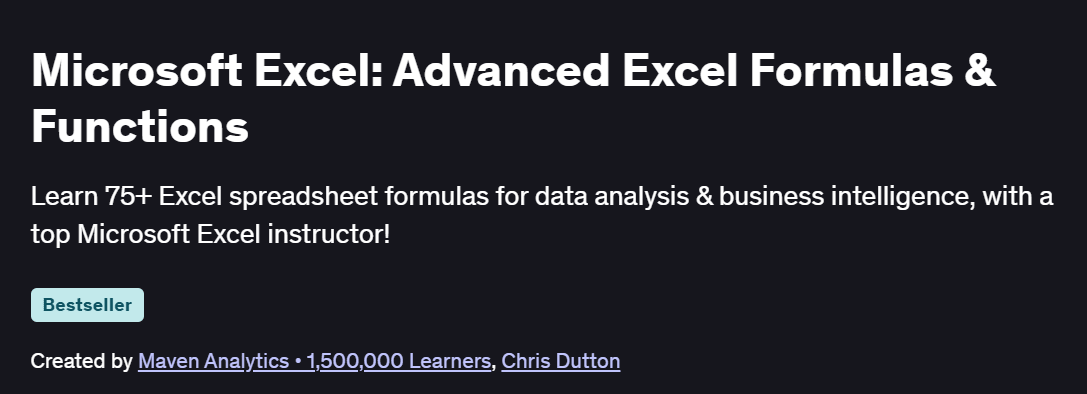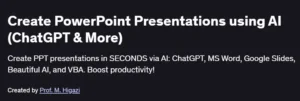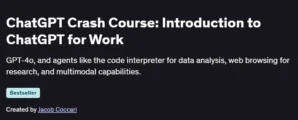What you will learn in Microsoft Excel: Advanced Excel Formulas & Functions Course
Excel Fundamentals: Begin with the basics, including navigation, formatting, and data entry techniques.
Core Functions: Master essential functions such as SUM, VLOOKUP, IF, INDEX, MATCH, and the newer XLOOKUP.
Data Analysis Tools: Learn to analyze large datasets using PivotTables, PowerPivot, and advanced charting techniques.
- Automation with Macros and VBA: Understand how to automate repetitive tasks using Macros and delve into Visual Basic for Applications (VBA) for custom solutions.
- Time-Saving Shortcuts: Discover keyboard shortcuts and best practices to enhance productivity.
- Real-World Applications: Apply your skills to create dynamic reports, dashboards, and solve complex business problems.
Program Overview
Excel Basics
⏳ 2 hours
- Introduction to Excel interface and basic operations.
- Data entry, formatting, and simple calculations.
- Basic chart creation and data visualization.
Intermediate Excel Functions
⏳ 4 hours
In-depth exploration of functions like VLOOKUP, IF, and nested formulas.
Data validation and conditional formatting.
Introduction to PivotTables for data summarization.
Advanced Data Analysis
⏳ 6 hours
Advanced charting techniques and data visualization.
Utilizing PowerPivot for complex data models.
Advanced PivotTable functionalities.
Automation with Macros and VBA
⏳ 6 hours
Recording and editing Macros to automate tasks.
Introduction to VBA programming for custom solutions.
Creating user-defined functions and automating workflows.
Final Project and Certification
⏳ 3 hours
Capstone project applying all learned skills.
Submission and review of project work.
Issuance of Udemy Certificate of Completion.
Get certificate
Job Outlook
- High Demand: Proficiency in Excel is a fundamental skill sought after in various industries, including finance, marketing, and operations.
- Career Advancement: Advanced Excel skills can lead to roles such as Data Analyst, Financial Analyst, and Business Intelligence Specialist.
- Freelancing Opportunities: Excel expertise opens doors to freelance gigs, such as data cleaning, reporting, and dashboard creation.
- Salary Potential: Professionals with advanced Excel skills can command higher salaries and better job prospects.
Specification: Microsoft Excel: Advanced Excel Formulas & Functions Course
|
FAQs
- Advanced formulas allow you to automate repetitive tasks and reduce dependency on manual steps.
- Unlike built-in tools, formulas can be customized to match specific business or reporting needs.
- They help you handle dynamic datasets that constantly change, without requiring you to rebuild reports.
- Knowledge of advanced formulas makes your work more flexible, portable, and adaptable across industries.
- Employers often look for Excel users who can handle complex formula-driven analysis, not just basic reporting.
- No, you don’t need advanced math knowledge—most Excel formulas are based on logic and structure, not heavy mathematics.
- Functions often focus on operations like lookup, text manipulation, conditional checks, and logical comparisons.
- Even financial or statistical formulas rely more on interpretation than solving math equations manually.
- The key skill is learning how formulas interact with each other and when to use them.
- A logical approach and practice will help you more than raw mathematical skills.
- Advanced formulas like
IFERROR,INDEX-MATCH, orXLOOKUPreduce manual corrections by automating accuracy checks. - They save time by eliminating repetitive copy-paste tasks and allow for dynamic updates.
- Built-in error-handling functions ensure cleaner data outputs and more reliable reports.
- Complex nested functions can solve problems that would otherwise need multiple manual steps.
- Once set up, formula-driven models reduce human error, making your analysis more trustworthy.
- Advanced Excel formulas are useful when datasets are not massive and need quick manipulation.
- Unlike SQL, Excel requires no coding environment or server access—it’s more accessible.
- Compared to BI tools, Excel offers quick, flexible, and lightweight analysis for day-to-day reporting.
- Many BI tools even allow formula-like expressions modeled on Excel functions.
- Employers still expect Excel expertise as a core skill, even in roles using other analytical platforms.
- Advanced Excel knowledge is a key differentiator in roles across finance, marketing, operations, HR, and IT.
- It boosts efficiency and positions you as a go-to problem solver in your workplace.
- Many managerial and analyst roles explicitly list advanced Excel as a required or preferred skill.
- Proficiency signals strong analytical thinking and adaptability, which employers highly value.
- Mastering formulas opens the door to transitioning into data analysis, business intelligence, or consulting roles.





